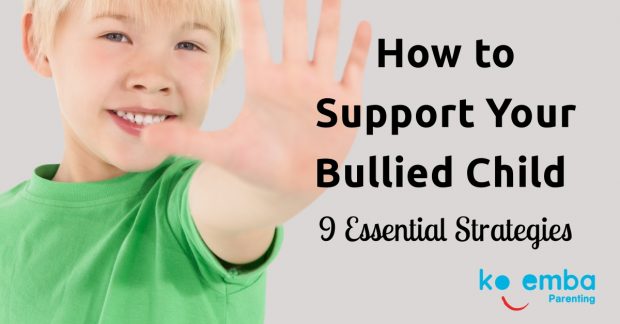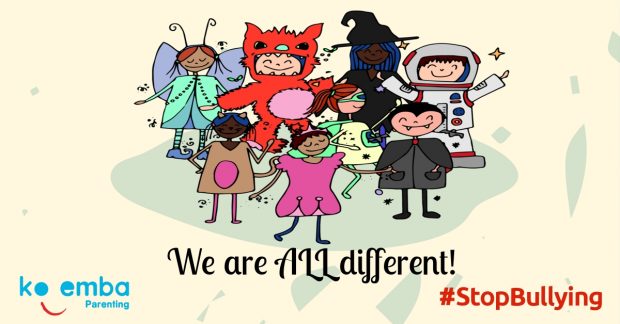If you are a parent and feeling concerned, upset or anxious because your child is being harrassed or teased, here’s how to support your bullied child:
“My heart is broken. My daughter is such a sweet child. But she tells me the other children are chasing her at school and calling her ‘piggy’.“
If your child has ever experienced this sort of pain, read on!
9 Essential Strategies – How to Support Your Bullied Child

#1 Keep calm so you can hold an objective frame of mind
Your child needs you to be connected; yet at the same time you need to contain your strong emotions. This matters because otherwise your upset can “contaminate” the listening space your child needs.
If you are reactive she may be affected by the reaction she’s sensing from you.
It’s possible that if you are over-anxious that she will hold back from telling you things you might need to hear, or otherwise a child may embellish the story when she finds she is repeatedly the centre of attention if she mentions such incidents. You want to support your child to work through the situation to develop happier outcomes; not stay stuck in it.
For more on how to keep calm in stressful situations, see my book, “Stop Yelling – 9 steps to calmer happier parenting)
#2 Take your child’s upset seriously
Some parents may respond with a comment like,
“You’re all right then!”
Your child wouldn’t be telling you about the incident if she was alright!
Bruises on the soul may not be visible but they can cause life-long scars.
#3 Recognise young children don’t always realise their behaviour is hurtful
Often a hurtful incident starts as a game – but crosses the boundary into “not okay” behaviour. If there seems to be bullying happening we need to be involved. Young children do not yet have the social skills to handle the situation alone. If the incident happened at school, hopefully, the teacher is your ally. Ask to meet with her, giving her as much detail as you know, in a clear objective way, stating what your child experienced. Then ask what steps will be taken to deal with this situation to ensure that other similar incidents will not happen. Bullying is not about only two children. Bullying is a community matter and school is our first formal environment where we need to learn social justice.
#4 Create a calm, safe space to chat about the incident
Create a space where your child can talk about the incident if she chooses.
Clarify as much detail as possible.
You need to hear what happened to figure out what response is needed.
If this might be more than a once-off minor incident, it’s important to keep a clear record of the facts of what happened. (Like any professional document, record only the facts; don’t write down your emotional reactions or any judgements. Only facts. This is important because if there is a pattern of bullying behaviour you need to be able to state what happened and when. That’s not easy to remember at a later date, especially when you are emotionally involved.
For more strategies on how to support your child to find a way forward in bullying situations, see my blog: “9 Inspiring Tips – How To Bully-Proof Your Child”
#5 Use “clean language” to discuss what happened
Word your questions and responses in a way that does not pollute your child’s thinking.
e.g. It’s not helpful to ask, “Was that girl mean to you?”
When you ask a question like that, you pollute your child’s mind with the thought that the other child was mean, which wasn’t necessarily your child’s experience.
Rather ask a “clean” question like, “What happened?”
#6 “Listen” to your child’s body language
It’s not only the words you want to listen to but your child’s body language, tone of voice and facial expression.
You’ll gain more insight into your child’s perspective and experience of what happened, and what’s needed now when you are tuned in to her
#7 Be empathetic as your child shares his story
It’s easy to want to check he’s telling it ”right”. The more he calms, the more he can clearly tell you what happened. the more he makes sense of what happened the more clearly your child can think anc can start envisioning a more powerful way of responding.

#8 Help your child envision how to respond differently
Avoid using statements like,
“Don’t be a baby!’
Stand up for yourself!”
Comments like these will only add to your child feeling ”not okay” and do not give your child a picture of how to respond in a more positive and empowering way. You want to create the thinking space for your child to be able to figure out what they can do to create a happier solution.
#9 Use the power of “What…?” questions
Once you sense your child is calm and ready to look for solutions, use “What…’ questions to help your child think about how they could handle a similar situation in the future.
“What could you do next time?”
“What helps you to stay strong inside yourself?”
The importance of dealing with the incident when your child is bullied
The wise parent uses these early incidents as opportunities to help their children learn to find healthy ways to deal with challenges in social interactions before an unhealthy pattern of passive or aggressive behaviour develops. When you respond to your child’s concerns you give a message, “You matter!” – a hugely important message if your child is feeling like they don’t matter to their peers.
Knowing how to respond helpfully when your child is bullied can help your child develop assertive behaviour that can shield them in a healthy way. This matters for your child’s happiness and self-esteem not only now in the immediate situation you’re facing – but it helps build resilience and self-esteem throughout life; important factors for your child’s mental health and well-being.



No comments yet.